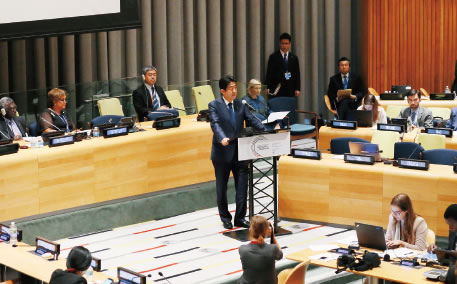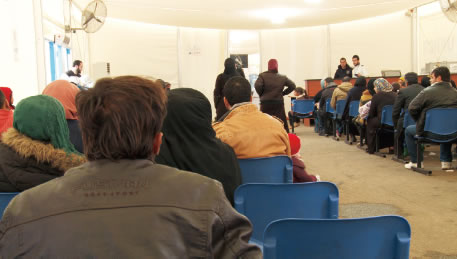Section 3 Humanitarian Assistance Including Refugee and Migrant Issues
Due to the impact of conflicts and natural disasters, acute poverty, climate change, etc., humanitarian crises have been becoming more complex, larger-scale, and more prolonged. As of 2016, the number of refugees and internally displaced persons (IDPs) forced to evacuate due to conflicts had reached its highest level since World War II.
In May 2016, immediately before the G7 Ise-Shima Summit, the World Humanitarian Summit was held for the first time in response to the call by then Secretary-General of the United Nations Ban Ki-moon, and former Prime Minister Yasuo Fukuda attended as the Representative of the Government of Japan. Approximately 9,000 participants, including the heads of State and Government of 55 countries, the heads of international organizations including then Secretary-General of the United Nations Ban Ki-moon, and representatives from NGOs, the private sector, and academic institutions, attended this summit. The participants discussed effective responses to intensifying humanitarian crises, such as the refugee issue in the Middle East region, and expressed their will to take concrete actions.

The Representative of the Government of Japan, Yasuo Fukuda delivers his speech at the World Humanitarian Summit in May 2016.
Representative Fukuda announced Japan’s assistance to realize social stability and growth to bring benefits to all people in the Middle East and North Africa, to empower people suffering under severe humanitarian conditions around the world so that they can build their own country’s future with their own hands. Examples include assistance totaling approximately $6 billion in the three years between 2016 and 2018, including human resources development for 20,000 people, the wider acceptance of Syrian students to Japan, and deployment of the “Japan Team for Refugees and Communities (J-TRaC)” consisting of Japan International Cooperation Agency (JICA) and other experts.
At the G7 Ise-Shima Summit, Japan, which held the presidency, stated that the issues of refugees and migration need to be recognized as global issues, and emphasized the importance of the basic philosophy of the 2030 Agenda that “no one will be left behind” when addressing those issues. In addition, Japan expressed its support for the United Nations-led initiatives on humanitarian crises and welcomed the World Humanitarian Summit, the United Nations Summit for Refugees and Migrants (discussed below), and the Leaders' Summit on Refugees hosted by then US President Barack Obama (discussed below). As the country holding the presidency of the G7 Ise-Shima Summit, Japan stated that it is indispensable to resolve the root causes of the instability in the Middle East from a medium- and long-term perspective, through supporting recovery and development of the region by such means as tackling poverty, disparity and youth unemployment in addition to extending humanitarian assistance, and announced that under Prime Minister Abe’s philosophy of “The Best Way is to Go in the Middle,” the Government of Japan committed to providing the aforementioned assistance package in order to prevent the expansion of violent extremism and build a “tolerant and stable society” in the region.

Prime Minister Shinzo Abe delivers a speech at the “United Nations Summit for Refugees and Migrants” held in September 2016. (Photo: Cabinet Public Relations Office)
In light of the major impact on the international community due to the movement of refugees and migrants, two summits addressing refugees and migration were held in September 2016 during the United Nations General Assembly high-level week. Prime Minister Abe attended both summits and delivered messages on Japan’s efforts in addressing the refugee issues.
On September 19, the “United Nations Summit for Refugees and Migrants” was held in response to the call by then United Nations Secretary-General Ban Ki-moon. It was the first summit level meeting held with a specific focus on refugees and migrants and was attended by many United Nations member states and organizations. Prime Minister Abe stated that Japan provides assistance taking into account the “humanitarian-development nexus,” a concept in which both humanitarian assistance to refugees and development cooperation for them and hosting countries and communities are implemented in parallel. Prime Minister Abe also announced that Japan would provide $2.8 billion in total during the three years from 2016 for humanitarian and self-reliance assistance to refugees and migrants as well as support to host countries and communities.

Children displaced by the flood in Myanmar in 2015 (Photo: WFP)
On September 20, the “Leaders' Summit on Refugees” was held in response to the call by then US President Barack Obama, attended by representatives of about 50 states and organizations including Japan. To better address the global refugee crises, then President Obama called on the participating states to increase the funds for humanitarian assistance, accept more refugees, and support the self-reliance of refugees.
Prime Minister Abe, after explaining that the leaders of the G7 had discussed the issue of refugees at the G7 Ise-Shima Summit, announced that in order to ensure “human security”, Japan would provide assistance to refugees totaling $2.8 billion, offer $100 million in total to the newly established World Bank Global Crisis Response Platform, and human resources development including educational assistance and vocational training to approximately 1 million people, and that the Japan Overseas Cooperation Volunteer (JOCV) as members of the J-TRaC would provide assistance to Syrian refugee children.
Through cooperation with international organizations, Japan will extend humanitarian as well as self-reliance assistance to refugees and migrants while implementing development cooperation to support economic development of host countries and communities. At the same time, Japan will enhance bilateral assistance which is beneficial to both refugees and their host countries, so as to promote the humanitarian and development nexus, and will steadily implement commitments made at the G7 Ise-Shima Summit.

Syrian refugees waiting for registration at the UNHCR reception center in Bekaa Valley in Lebanon (Photo: UNHCR)
